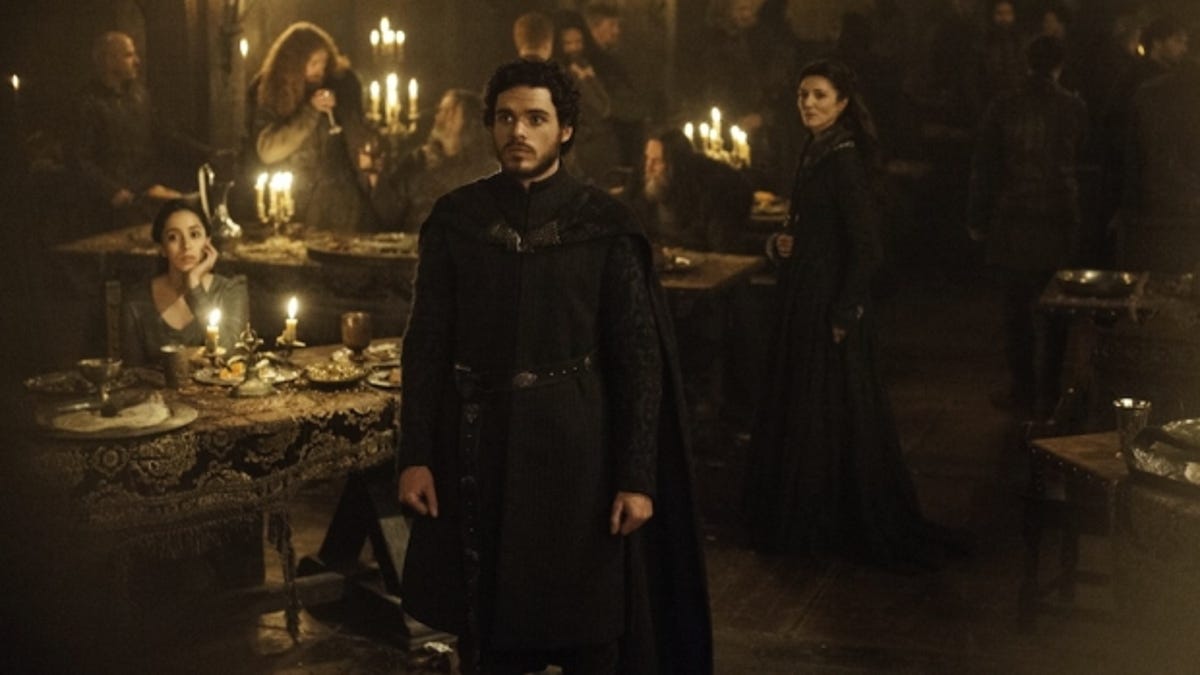
WARNING: SPOILERS! Of course there are no spoilers in this post. It’s a post about spoilers, and how there will always be spoilers, and how we will never be rid of them. But there are vague hints, and links to spoilers, so be careful what you click.
Last night UK viewers watched the ninth episode of the third season of Game of Thrones, on Sky and illegal download. It was absolutely spectacular, with a twist of such wrenching force that people screamed and cried. Here’s a brilliant supercut video of them doing just that, and here’s a great collection of extreme reactions on Twitter (obviously: spoilers).-
Except that video and those tweets aren’t gobsmacked Brits, they’re dumbstruck Americans, who watched it the night before.
I won’t say what happened, but if you’ve been on Twitter or Facebook in the last 36 hours, the chances are you probably know — whether you want to or not.
It’s pretty amazing that those people hadn’t had it spoiled for them already. The book that episode is based on was first published 13 years ago, and millions of people have read them, especially since the TV series started. But most of those readers will have experienced George RR Martin’s jaw-dropping voltes-face unspoiled and won’t want to ruin it for others. They’ll keep schtum unless they’re in the confirmed company of people who’ve read the whole saga.
(Confession: I’ve spoiled some pretty whopping twists for our video producer Marc, who’s really into the show, by accidentally discussing the books in his earshot. Sorry Marc.)
The time-zone curse
This isn’t the case for TV, which we assume is communal. TV shows like Game of Thrones have many millions of people all watching at the same time. And even if we finally arrive at the promised land of same-day digital availability — no more ‘This is not available in your territory’, no more staggered release dates — shows will still have a specific release time, and many people will still watch the minute it’s available.
That time will be evening in the US. Because almost all the TV shows we get excited about and spoil on the Internet are made in the US with predominantly US audiences in mind. It’s the biggest, richest English-speaking audience by far. Doctor Who and Forbrydelsen (The Killing) are rare exceptions.
Evening in the US is midnight here, and late morning the next day in Australia. Not ideal TV time — we’ll have to wait until the following night, as we do with Game of Thrones now. But you’ll get up the next day and check your social media feeds and all the people you follow in the US will have been talking about what the hell just happened. Even if they’re kindly unspecific, you will get wind of something big, as many UK viewers did on Monday before they got home.
Filter what you can
There are some ways round this already — view your feeds through a third-party app and you can filter them for mentions of a specific thing. (Here’s a handy CNET guide to using the Chrome extension Silencer.) Several people I know do this to avoid their feeds getting swamped by stuff about football, or the X-Factor.
Those apps aren’t mainstream though. The official Twitter and Facebook apps and webpages do not have filtering. They may do in the future, if spoilers become such a big deal that people demand them. Then it will become social etiquette to include a hashtag that lets people avoid your messages. If you break that etiquette, scorn and hatred will rain down upon you, like [redacted] at a [redacted]. You will be shunned, or at least unfollowed.
The future of spoilers
Another possibility is that shows will be released all at once, as Netflix did with House of Cards. If that becomes the norm, the potential for spoilers will be diluted. People won’t say, “OMG WHAT JUST HAPPENED?!” they’ll say, “I JUST WATCHED THAT THING AND OMG!?” They’ll be more likely to check that other people have seen it before blurting it out. It’ll be more like having read a book.
It seems likely that companies that make premium drama like HBO will evolve into online distribution sites. But TV networks will always exist to broadcast live news and sport, and need other stuff to fill the other hours of the day. I reckon there’ll always be episodic drama — such as soaps — that will be on at a specific time, that people make an appointment to watch.
Advertisers are desperate to be associated with shows with buzz, shows people love to talk about. Buzz means spoilers. So while the next Game of Thrones might be less spoiled, I don’t think we’ll ever be truly rid of them.
Do you have any spoiler horror stories? How do you avoid them? Leave your completely spoiler-free comments below, or on our Facebook page.




